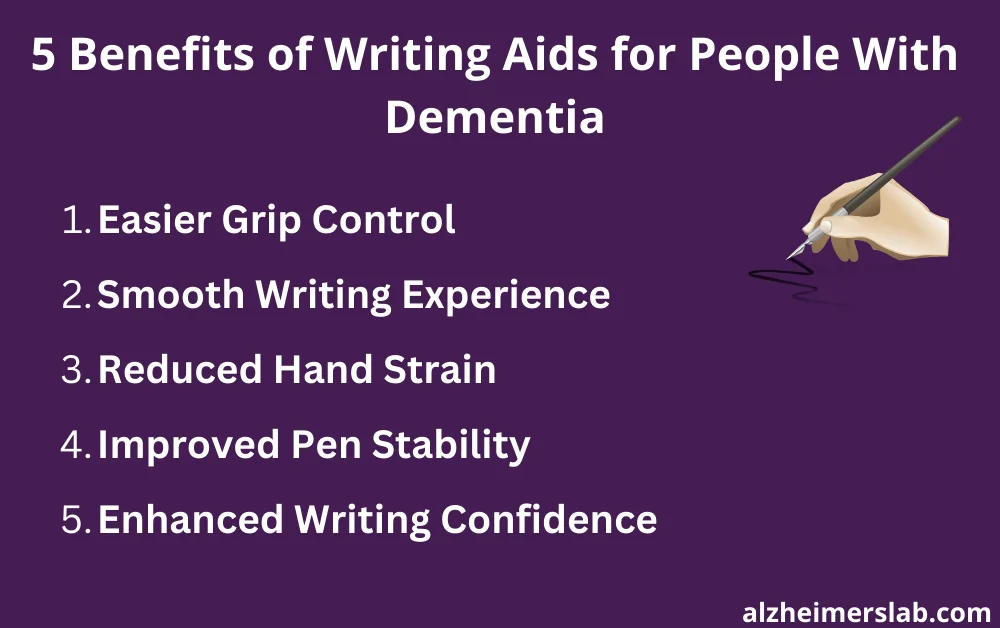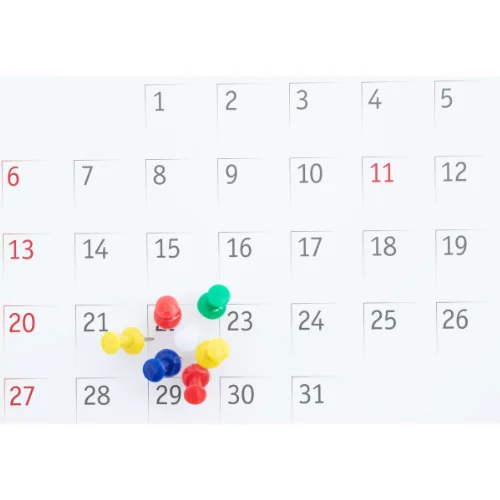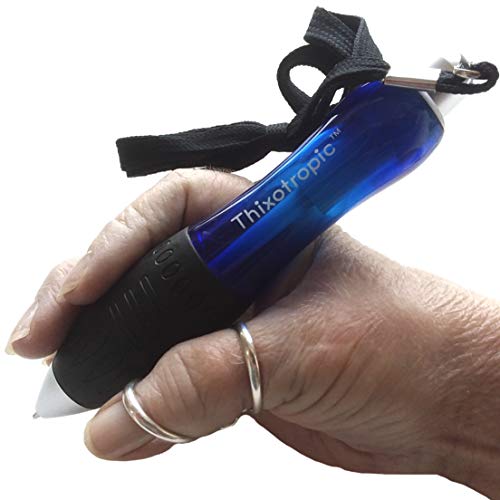Best Writing Aids for People With Dementia
alzheimerslab.com is reader-supported. I may earn a commission when you purchase via links on this page
Are you or a loved one living with dementia and struggling to express thoughts and memories through writing? It can be a challenging experience, but you’re not alone. In this blog, I’ll introduce you to the best writing aids specifically designed to support individuals with dementia. These aids can help stimulate memory, enhance cognitive abilities, and provide a therapeutic outlet for self-expression.

Let’s explore these invaluable tools that can unlock the power of writing, enabling you to preserve and share your stories in a meaningful way.
Here Are the Best Writing Aids for People With Dementia
1. Super Big Fat Pens for Arthritis by Thixotropic Store
The Super Big Fat Pens for Arthritis by Thixotropic Store are recommended for caregivers assisting individuals with writing difficulties, particularly those with dementia, hand pain, or limited mobility. These pens stand out due to their user-friendly design, specifically tailored to address these challenges.
Featuring a crystal blue body with a non-slip rubber grip, these pens ensure a secure hold. With dimensions of 5″ in length, 1″ in diameter, and weighing 1 oz., they strike a balance between functionality and comfort.
One notable advantage of these pens is their large diameter barrel. Regular-sized pens can be hard to grasp or pinch for people with arthritis. However, the size of these pens is specifically designed to alleviate such difficulties, providing a more manageable grip. This makes them an ideal choice for individuals experiencing arthritis or hand pain.
Another commendable aspect of these pens is their versatility in accommodating different holding styles. Unlike pens that enforce a specific ergonomic grip, the Super Big Fat Pens have a wide-rounded profile, allowing users to grip them in their preferred way. This accommodation ensures optimal comfort during writing sessions, enabling users to find the most suitable and comfortable position for their hand.
Additionally, these pens come with several extra features that enhance their value. Equipped with black ink and accepting “Parker Style” refills, they offer a smooth and reliable writing experience. Furthermore, the package includes five additional ink cartridges, ensuring long-lasting usage before replacements are needed.
In conclusion, the Super Big Fat Pens for Arthritis by Thixotropic Store are an exceptional choice for individuals with dementia, hand pain, or restricted mobility. Their easy-to-hold design, non-slip rubber grip, and large-diameter barrel cater to the unique needs of users facing such challenges.
Pros
- Easy to hold and grip, particularly for individuals with dementia or hand pain
- Large diameter barrel makes it easier to grasp for those with arthritis
- Comes with five extra ink cartridges for long-lasting usage
- Non-slip rubber grip on the crystal blue body ensures a secure hold
Cons
- The weight of the pen may be too light for some users
- Requires “Parker Style” refills, which might be less accessible in certain areas
2. Zonon Writing Aid Trainer
The Zonon Writing Aid Trainer is an excellent product for caregivers assisting individuals with dementia in their writing tasks. It includes six foam egg grips that are not only adorable but also odorless, making them perfect for daily use. The soft foam construction of these aids ensures a comfortable grip and minimal strain while writing.
These writing aids are crafted from high-quality foam (EVA) and have a middle hole for easy insertion of pens or pencils. The foam material’s softness enhances the overall writing experience, making it easier for individuals to write for extended periods without discomfort.
With proper size, the Zonon Writing Aid Trainer accommodates pens with a diameter of 0.28-0.31 inches (7-8 mm). Its compact design allows for easy portability, making it convenient to use anywhere. The egg shape of the pencil pillows provides cushioning and is suitable for individuals with hand conditions like arthritis or carpal syndrome, as well as young learners.
These writing aids effectively alleviate common issues associated with prolonged writing. They provide comfort and reduce hand fatigue, pain, discomfort, and calluses that can arise from extensive writing. This makes them valuable tools for individuals with dementia or anyone looking to improve their handwriting.
In conclusion, the Zonon Writing Aid Trainer is a reliable and effective solution for caregivers assisting individuals with dementia in writing tasks. Its high-quality foam construction, proper sizing, and well-designed features offer both comfort and functionality. Whether dealing with hand conditions or seeking an enhanced writing experience, this tool can make a noticeable difference.
Pros
- Soft foam material for a comfortable grip
- Adorable and classic color design
- Suitable for both children and adults
- Helps reduce hand fatigue and pain
Cons
- May not fit all pencil cases
- Only available in a set of six
- Not a universal solution for all writing difficulties
3. RinG-Pen Ultra Grip Support for Writing
The RinG-Pen Ultra Grip Support for Writing is a valuable tool for caregivers assisting individuals with dementia. It effectively aids those with hand weakness, arthritis, carpal tunnel syndrome, or repetitive stress syndrome by reducing writing pressure and preventing pain and muscle cramps.
The versatility of the RinG-Pen Ultra is a standout feature. It can accommodate various writing tools like pens, pencils, markers, and even eating utensils and small personal hygiene items. This adaptability is beneficial for individuals with dementia who require assistance with different everyday tasks.
The RinG-Pen Ultra offers sizing options for optimal comfort and functionality. The large size is suitable for most men’s and larger women’s hands, the medium size is ideal for most women’s and smaller men’s hands, and the small size is specifically tailored for children. It’s important to note that this writing aid is designed for right-hand use only.
Overall, the RinG-Pen Ultra Grip Support for Writing is an excellent choice for caregivers assisting individuals with dementia. Its versatility in supporting various writing tools and accommodating different hand sizes makes it a reliable solution for different needs.
By improving fine motor skills and alleviating hand weakness, it provides a comfortable and enjoyable writing experience for individuals with dementia.
Pros
- Versatile support for various writing tools and utensils
- Alleviates hand weakness and improves fine motor skills
- Reduces pressure, preventing pain and muscle cramps
- Available in different sizes to accommodate various hand sizes
Cons
- Limited to right-hand use only
- Requires adjustment and familiarization for optimal use
4. PenAgain 3 Pack Pens
The PenAgain 3 Pack Pens provide a practical solution for individuals with dementia facing difficulties in writing. Its ergonomic wishbone-shaped body ensures a comfortable grip, enabling a smooth writing experience.
This pen’s dynamic “tripod” design encourages proper writing posture, reducing hand fatigue and the risk of writer’s cramps. It is versatile for both left-handed and right-handed users, accommodating various writing tasks ranging from simple notes to creative projects.
Young students, especially, benefit from this writing aid as it allows them to concentrate on the content instead of struggling with pen grip or writing speed. Consequently, neater handwriting can be achieved, potentially leading to improved academic performance. The innovative design of the PenAgain revolutionizes the writing experience, making it accessible and enjoyable for individuals with dementia.
The PenAgain 3 Pack Pens are available in vibrant colors like red, blue, and neon green, adding a touch of fun and personalization to the writing process. The retractable and refillable feature ensures convenience and long-lasting use. Moreover, the all-purpose clip allows easy attachment to notebooks, pockets, or other surfaces, ensuring the pen is always accessible.
In conclusion, the PenAgain 3 Pack Pens are an excellent choice for individuals with dementia who need writing assistance. The ergonomic design prioritizes comfort and minimizes hand fatigue.
By shifting the focus from writing mechanics to content, neater handwriting and potentially better academic performance can be achieved. The colorful assortment, retractable feature, and all-purpose clip enhance usability and convenience, making the PenAgain pens a valuable tool for improving the writing experience of individuals with dementia.
Pros
- Ergonomic wishbone shape for a comfortable grip
- “Tripod” design promotes proper writing position
- Suitable for left or right-handed individuals
- Assorted colors add fun and personalization
Cons
- May take time to adjust to the unique design
- Not specifically tailored for individuals with advanced dementia
5. 3-Pack Pencil Grips by DMFLY
The 3 Pack Pencil Grips by DMFLY is an ideal tool for individuals with dementia needing writing assistance. Specifically designed as a training aid, these grips are perfect for beginners, such as children learning proper pencil grip and writing techniques. They feature a cute butterfly hollow design with a two-finger jack, ensuring a comfortable and ergonomic grip.
What sets these pencil grips apart is their versatility. Available in multiple colors, they add excitement to the writing process. They easily fit onto pencils, pens without grips, and other standard-size writing instruments with a diameter of 7.2-8.2 mm.
A standout feature is their breathable design. Unlike similar products, the butterfly hollow design allows for improved airflow and prevents sweating, making them suitable for children as young as 2 to 4 years old. Comfortable grips promote positive handwriting habits and encourage children to enjoy writing.
Moreover, the grips cater to both right-handed and left-handed users. The two-finger design effortlessly accommodates the thumb and index finger, while the bottom groove provides support for the middle finger. They also prevent the middle finger from slipping, ensuring a proper grip for extended periods. The grips facilitate quick and hassle-free positioning for individuals with dementia.
In terms of practicality, the 3 Pack Pencil Grips offer a risk-free buying experience with a 24-month, 100% money-back guarantee. They are compact for easy storage, fitting perfectly in pencil cases, backpack pockets, and other compartments. The package includes three grips in different colors, making it convenient for families or those who prefer to have extras.
To sum up, the 3 Pack Pencil Grips is an excellent choice for individuals with dementia requiring writing aids. They guide users to hold a pencil correctly, providing an ergonomic and comfortable design suitable for beginners. With their breathable hollow design, versatility for right and left-hand use, and convenient storage, these grips offer a positive experience for both children and adults.
Pros
- Cute and ergonomic butterfly design
- Breathable and comfortable for extended use
- Suitable for both right-handed and left-handed users
Cons
- Some users may prefer a different grip style
Buyer’s Guide: Best Writing Aids for People With Dementia

Living with dementia can present challenges in various aspects of daily life, including writing and communication. However, there are numerous writing aids available that can significantly assist individuals with dementia in maintaining their ability to write and express themselves effectively.
This buyer’s guide aims to provide an overview of the best writing aids specifically designed for people with dementia. When considering these aids, it’s important to prioritize simplicity, ease of use, and ergonomic design to enhance the writing experience and maximize independence.
1. Large Print Pens

Large print pens are specifically designed with wider barrels, making them easier to grip for individuals with limited dexterity or hand strength. These pens often feature a larger font size printed on the barrel, making them more visible and reducing strain while writing. Look for pens with comfortable grips and smooth ink flow for effortless writing.
2. Adaptive Writing Tools
Adaptive writing tools can be invaluable for individuals with dementia who may have difficulty holding a traditional pen or pencil. These tools typically have a larger handle or a built-in grip that accommodates various hand sizes and reduces strain. Some adaptive writing aids include weighted pens, pencil grips, and ergonomic writing utensils that can improve control and stability while writing.
3. Digital Writing Aids

In recent years, technology has provided innovative solutions for people with dementia. Digital writing aids offer a range of features that can support individuals in their writing endeavors. Look for tablets or digital devices with touch screens that allow users to write with a stylus or their fingers. Features such as auto-correction, word prediction, and voice-to-text capabilities can assist individuals with finding the right words and reduce the frustration of spelling or grammar errors.
4. Memory Journals

Memory journals or guided writing journals can help individuals with dementia preserve their memories and engage in meaningful self-expression. These journals often provide prompts or questions that stimulate memories and encourage personal storytelling. Look for journals with large print, clear formatting, and ample space for writing. Additionally, consider journals that have removable or refillable pages, allowing for flexibility and organization.
5. Writing Apps
Mobile applications designed specifically for people with dementia can be useful tools for enhancing writing skills and cognitive abilities. Look for apps that offer simple interfaces, intuitive navigation, and various writing exercises or games that promote memory recall, word association, and creative writing. It’s beneficial to choose customizable apps and allow for personalized content creation.
6. Voice Recorders

For individuals who may find writing challenging, voice recorders provide an alternative method for capturing thoughts, ideas, and memories. Look for user-friendly voice recorders with large buttons and clear instructions. Consider models that have easy playback options and the ability to transfer recordings to a computer or other devices for later transcription or sharing.
7. Reminders and Timers

Maintaining a writing routine can be helpful for individuals with dementia, and reminders and timers can assist in establishing regular writing habits. Look for easy-to-use reminder devices that offer visual or auditory cues to prompt writing sessions. Timers can also help individuals stay focused and provide structure during writing activities.
When selecting writing aids for people with dementia, prioritize simplicity, ease of use, and ergonomic design. Large print pens, adaptive writing tools, digital writing aids, memory journals, writing apps, voice recorders, and reminders/timers are all valuable aids to consider. By choosing the right tools, individuals with dementia can continue to enjoy the benefits of writing, expressing their thoughts, and engaging in meaningful self-expression.
Frequently Asked Questions (FAQs)
Writing aids for people with dementia are tools designed to assist individuals who may be experiencing difficulties with writing, such as memory loss, decreased motor skills, or language impairments. These aids aim to make writing tasks easier and more accessible for individuals with dementia.
Writing aids can greatly enhance the quality of life for individuals with dementia by promoting independence and self-expression. They can help individuals maintain their ability to communicate, express thoughts, and engage in meaningful activities for as long as possible.
There is a range of writing aids available for people with dementia. Some common examples include adaptive pens and pencils with larger grips or ergonomic designs, specialized writing paper with larger lines or spacing, and writing guides or templates to assist with letter formation and alignment.
Choosing the right writing aid depends on the individual’s specific needs and preferences. Consider factors such as the individual’s motor skills, visual impairments, and cognitive abilities. It may be helpful to consult with healthcare professionals or occupational therapists who specialize in dementia care for guidance.
Writing aids for people with dementia can be purchased from various sources. You can find them at medical supply stores, online retailers specializing in adaptive equipment, and sometimes even in local pharmacies. Additionally, occupational therapists or dementia care organizations may offer recommendations or resources for purchasing these aids.
Insurance coverage for writing aids may vary depending on the specific policy and location. Some insurance plans may cover certain adaptive equipment or assistive devices prescribed by a healthcare professional. It is advisable to check with the insurance provider or Medicare to determine if writing aids are eligible for coverage.
The cost of writing aids can vary widely depending on the type and complexity of the device. Basic writing aids, such as adaptive pens or pencils, may range from $10 to $30. More advanced aids, like electronic writing tablets or devices with voice recognition capabilities, can range from $50 to several hundred dollars.
Yes, many writing aids designed for people with dementia can also be beneficial for individuals with other conditions or disabilities. Individuals with conditions such as Parkinson’s disease, multiple sclerosis, or stroke-related impairments may find these aids helpful in overcoming writing difficulties.
In addition to writing aids, there are alternative ways to facilitate communication and self-expression for individuals with dementia. These may include using voice-recognition software, digital tablets, or devices, or engaging in activities that focus on verbal communication, such as storytelling or reminiscence therapy.
To ensure the best experience when using writing aids, it’s important to create a supportive and comfortable environment. Encourage patience and allow ample time for the individual to express themselves. Simplify the writing tasks, use clear instructions, and offer positive reinforcement to boost confidence and motivation.
Final Word
Of the products discussed above, I would choose the Super Big Fat Pens for Arthritis by Thixotropic Store. Their user-friendly design, accommodating grip, and additional features make them the top choice for caregivers and individuals with writing difficulties. Try them out and share your thoughts in the comments!





